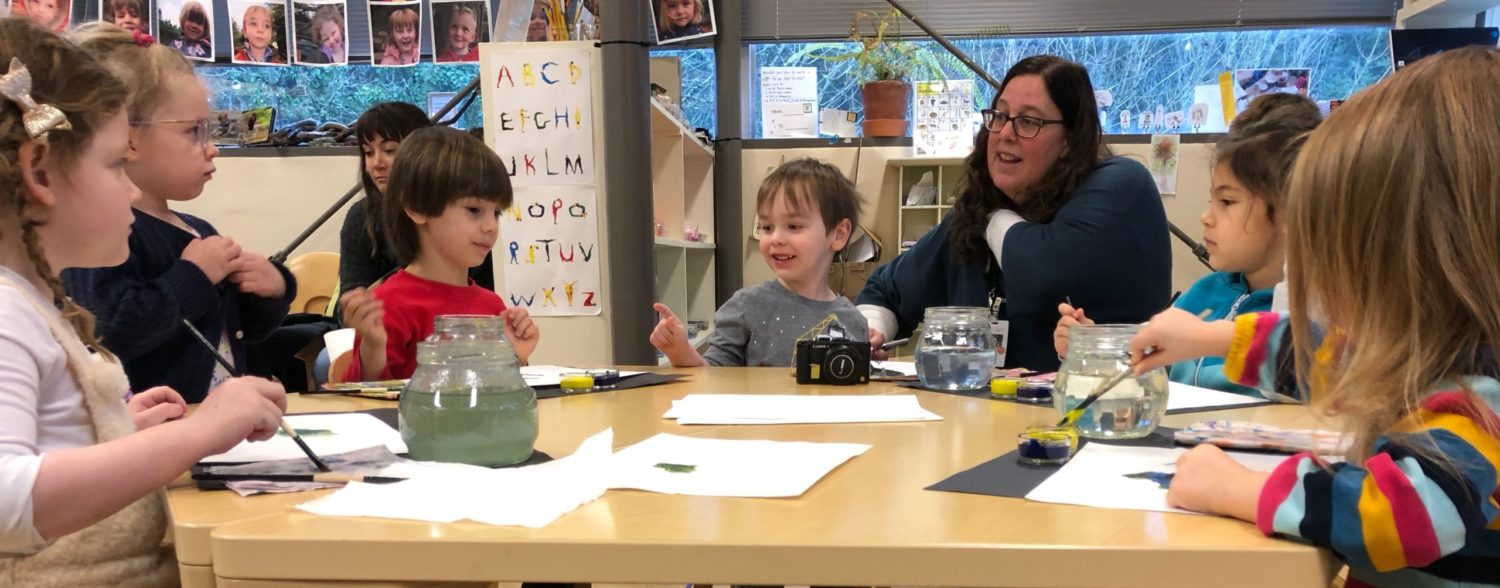An ecology of listening

“What’s the thing that most people miss above all? It’s just the chance to be gregarious, to be with other people. Human beings are socially evolved primates. It wasn’t that many generations ago that we were sitting on the floor of the Savannah picking lice out of each other’s fur. So, it’s hard to be told not to go touch people, hug people, be near people, talk to people, shake hands – all the things that we’re used to. When we get out of detention, I hope it will be a reminder to us how much social distancing we’ve been doing already these last few decades… I think that we might – just might – prize each other a little bit more – and that if we do, we can begin to see how, in that pleasure, we might begin to replace some of the consumption that… drives every environmental challenge that we face. Who knows? It’s also possible that we’ll just set up all the pins in the bowling alley again.”
– Bill McKibben
At Opal School, part of the way we resist holding each other at a distance and habitually resetting the bowling pins is our annual summer symposium. For most of the last two decades, we’ve followed the completion of the school year energetically sifting through what we’ve collected, reflecting on what we’ve learned, how it has changed us, and what new questions we’re ready to ask. We’ve then opened our doors to fellow educators from around the world, eager to explore these stories and questions together. We’ve organized around themes of common concern: recent years have explored Growing Changemakers, Inventing the World, A Pedagogy of Play, and Education, The Arts, and Democracy.
Being together for those three days in June – with each other and with you – is transformative. It moves us out of the bowling alley, inviting new ways to play with ideas and possibilities.
This year, as we considered what has been particularly alive in our community, we selected the topic of An Ecology of Listening.
We have been asking,
- What is the relationship between Playful Inquiry, teacher-research, and anti-racist, pro-democracy, social justice education?
- How do we create a culture where listening is transformational for all?
- How does documentation of practice support development of theories that lead to new practices and new theories? How can we help each other stay open to the unknown?
In those questions, we heard echoes of the early years of our symposia, which were all called A Pedagogy of Listening and Relationships. We recognized that our thinking had evolved towards seeing that pedagogy as an ecosystem – and we knew we wanted to crack that open with others.
We articulated that title and those questions before the pandemic hit, causing us to close our school doors and cover our faces. I’m thankful that we came to the questions first – because I don’t know if we would have come to them during this crisis, and they feel meaningful, important, and transcendent.
Rather than the three days we’ve gathered in Portland in previous years, we’ve imagined a rich month together, which will go like this:
- For three weeks beginning June 10, we’ll be sharing new content on Wednesdays and Fridays.
- On Saturdays, we’ll invite you to make meaning of that content using tools of the arts.
- On Tuesdays, we’ll bring you together to chat with other participants to reflect on your experiences and imagine new possibilities
- After three weeks of that pattern, we’ll bring back many of the presenters to discuss participant response to their contributions – and their response to each other’s.
Recognizing that we’ll never hit a schedule that works equally well for Seattle, Stockholm, and Singapore (and that within each of those locations, daily demands vary greatly), participants never have to be “live” at the same time – everything will be recorded to match a schedule that works for each participant – although there will be some opportunities for live connections.
With the launch a little less than a month away, we wanted to invite you to dig into these questions through a few readings. (Symposium participants, you’ll find these gathered for you in the course.)
- Carlina Rinaldi is one of the thinkers who first led us to consider our work as a pedagogy of listening and relationships. Her 2004 essay, The Relationship between Documentation and Assessment, opens doors to thinking about this ecology.
- Jennifer L. Eberhardt’s Biased uncovers how our predictive dispositions guide all of our encounters. We invite you to read Chapter Two from the book to provoke new thinking about how a stance of staying open to recategorization and greater possibility from the youngest years opens doors to dismantling systems of oppression. If you don’t yet own the book, you can buy the Kindle version here for $1.99.
- That idea of playfulness around “what else could it be?” is an animating force in Anne Pelo and Margie Carter’s From Teaching to Thinking. In “Creating a Culture of Inquiry”, they propose ways to hold the tension of conflicting ideas.
- Lastly, we suggest reading David Bohm’s “On Dialogue” to illustrate that space we might hold with each other – and you might hold with children – as we talk.
We hope these readings will get you talking: let’s try using #OpalSymposium20 on Twitter.
While we are unable to sit aside each other, hugging and shaking hands as we have in previous years, we can lean towards each other as we create a productive solidarity — as we speak and listen together.
